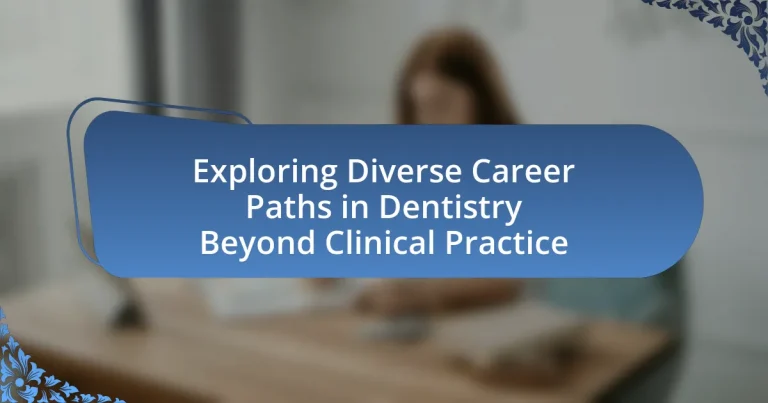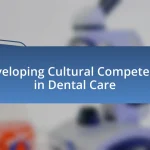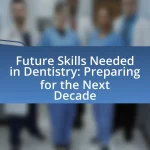The article explores diverse career paths in dentistry beyond traditional clinical practice, highlighting opportunities in dental education, research, public health, administration, and consulting. It outlines how dental professionals can transition into non-clinical roles by leveraging their clinical knowledge and pursuing additional education and certifications. Key non-clinical positions discussed include dental educators, researchers, and administrators, each contributing to the advancement of the dental field in unique ways. The article emphasizes the importance of networking, mentorship, and skill development in facilitating these career transitions, while also addressing the benefits of pursuing non-clinical careers, such as improved work-life balance and job satisfaction.

What are the diverse career paths in dentistry beyond clinical practice?
Diverse career paths in dentistry beyond clinical practice include roles in dental education, research, public health, dental administration, and dental consulting. Dental educators teach future dentists in academic institutions, while researchers contribute to advancements in dental science through studies and clinical trials. Public health professionals focus on community health initiatives and preventive care, addressing oral health disparities. Dental administrators manage dental practices or organizations, overseeing operations and compliance. Lastly, dental consultants provide expertise to practices on improving efficiency and patient care. These roles leverage dental knowledge in various impactful ways, demonstrating the versatility of a dental degree.
How can dental professionals explore non-clinical roles?
Dental professionals can explore non-clinical roles by pursuing opportunities in areas such as dental education, research, public health, and dental product development. These roles allow dental professionals to leverage their clinical knowledge while contributing to the field in different capacities. For instance, dental educators can teach at dental schools, sharing their expertise with future practitioners, while those in research can work on studies that advance dental science. Public health roles enable professionals to focus on community health initiatives, addressing oral health disparities. Additionally, involvement in dental product development allows professionals to collaborate with companies to create innovative dental technologies and products. Each of these non-clinical paths utilizes the foundational skills and knowledge gained through clinical practice, providing meaningful career alternatives.
What types of non-clinical roles are available in dentistry?
Non-clinical roles in dentistry include dental administration, dental marketing, dental education, dental research, and dental sales. Dental administration involves managing office operations, scheduling, and patient relations, which are essential for the smooth functioning of dental practices. Dental marketing focuses on promoting dental services and enhancing patient engagement through various strategies. Dental education encompasses teaching future dental professionals in academic settings, while dental research involves conducting studies to advance knowledge in oral health. Lastly, dental sales representatives work with dental products and equipment, providing support and information to dental practices. These roles are vital for the overall success and advancement of the dental field.
How do these roles differ from traditional clinical practice?
Roles in dentistry beyond traditional clinical practice differ primarily in their focus and responsibilities. While traditional clinical practice centers on direct patient care, diagnosis, and treatment, alternative roles often emphasize research, education, administration, or public health initiatives. For instance, dental educators develop curricula and teach future dentists, while dental researchers investigate new materials or techniques, contributing to advancements in the field. Additionally, roles in dental administration involve managing practices or organizations, focusing on operational efficiency rather than patient interaction. This distinction highlights a shift from hands-on clinical work to broader contributions that support the dental profession and public health.
Why is it important to consider alternative career paths in dentistry?
Considering alternative career paths in dentistry is important because it allows dental professionals to leverage their skills in diverse ways that may align better with their personal interests and market demands. The dental field is evolving, with opportunities in areas such as dental education, research, public health, and dental technology, which can provide fulfilling careers outside of traditional clinical practice. For instance, the American Dental Association reports that only about 60% of dental graduates enter private practice, indicating a significant portion of professionals are exploring other avenues. This diversification can lead to increased job satisfaction, better work-life balance, and the potential for innovation within the field.
What are the benefits of pursuing non-clinical careers in dentistry?
Pursuing non-clinical careers in dentistry offers several benefits, including diverse job opportunities, work-life balance, and the ability to influence dental policy and education. Non-clinical roles, such as dental research, public health, and dental education, allow professionals to utilize their dental knowledge in impactful ways without the demands of patient care. For instance, dental public health professionals can address community health issues, while educators shape the next generation of dentists. Additionally, non-clinical positions often provide more predictable hours and less stress compared to clinical practice, contributing to improved job satisfaction and personal well-being.
How can alternative paths enhance professional satisfaction?
Alternative paths can enhance professional satisfaction by providing opportunities for personal growth, skill diversification, and work-life balance. In the field of dentistry, pursuing roles such as dental education, research, or public health allows professionals to apply their expertise in varied contexts, which can lead to increased job fulfillment. Research indicates that professionals who engage in diverse career paths report higher levels of job satisfaction due to the ability to explore different interests and reduce burnout associated with traditional clinical roles. For instance, a study published in the Journal of Dental Education found that dentists who transitioned to teaching roles experienced a renewed sense of purpose and engagement in their work.
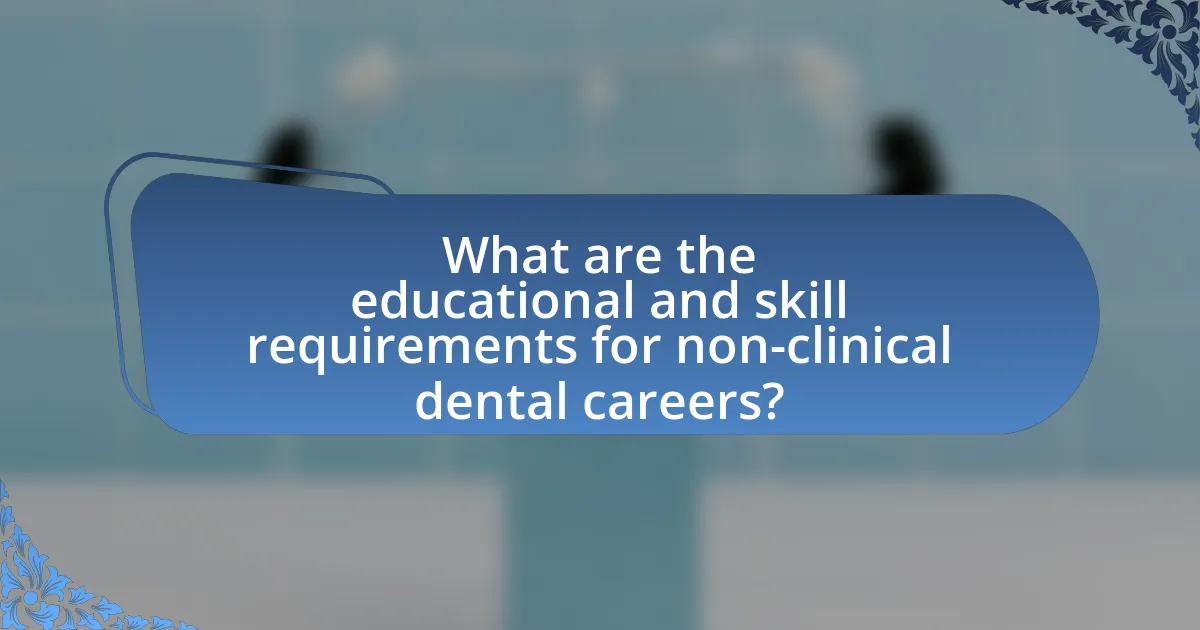
What are the educational and skill requirements for non-clinical dental careers?
Non-clinical dental careers typically require a bachelor’s degree in a relevant field such as dental hygiene, health administration, or business management. Many positions also benefit from advanced degrees, such as a master’s in public health or dental education, which can enhance career prospects and expertise.
In addition to formal education, essential skills for non-clinical roles include strong communication abilities, organizational skills, and proficiency in data analysis or management software. For instance, roles in dental marketing or practice management often require knowledge of business operations and marketing strategies.
The American Dental Association emphasizes the importance of these educational backgrounds and skills, noting that they are crucial for effective management and support within dental practices.
What qualifications are necessary for transitioning to non-clinical roles?
To transition to non-clinical roles in dentistry, individuals typically require a combination of relevant education, skills, and experience. A bachelor’s degree in a related field, such as healthcare administration or public health, is often essential. Additionally, obtaining certifications in areas like project management or healthcare management can enhance qualifications. Experience in clinical settings can provide valuable insights, while strong communication, analytical, and leadership skills are crucial for success in non-clinical roles. These qualifications align with industry standards, as many employers seek candidates who possess both educational credentials and practical experience to effectively navigate the complexities of non-clinical positions in dentistry.
How can dental professionals acquire the necessary skills for these roles?
Dental professionals can acquire the necessary skills for diverse roles beyond clinical practice through targeted education and specialized training programs. Engaging in continuing education courses, attending workshops, and pursuing certifications in areas such as dental administration, public health, or dental education equips professionals with relevant knowledge and competencies. For instance, the American Dental Association offers various resources and courses that focus on non-clinical skills, which are essential for roles in management or policy-making. Additionally, networking with professionals in desired fields and seeking mentorship can provide insights and practical experience, further enhancing skill acquisition.
What additional certifications might be beneficial for non-clinical positions?
Certifications such as Certified Dental Practice Management Administrator (CDPMA), Certified Dental Assistant (CDA), and Certified Healthcare Administrative Professional (CHAP) can be beneficial for non-clinical positions in dentistry. These certifications enhance knowledge in practice management, administrative tasks, and healthcare regulations, which are crucial for roles like dental office manager, practice administrator, or healthcare consultant. For instance, the CDPMA certification demonstrates expertise in managing dental practices effectively, while the CDA certification provides foundational knowledge in dental assisting, even for non-clinical roles.
How can networking and mentorship aid in exploring non-clinical careers?
Networking and mentorship significantly aid in exploring non-clinical careers by providing access to industry insights and professional connections. Through networking, individuals can meet professionals already established in non-clinical roles, gaining firsthand knowledge about various career paths such as dental consulting, education, or research. Mentorship offers guidance from experienced individuals who can share their experiences, help navigate career transitions, and provide valuable advice on skill development and job opportunities. Research indicates that 70% of people find their jobs through networking, highlighting its effectiveness in career exploration. Additionally, mentorship has been shown to enhance career satisfaction and advancement, as mentees often report increased confidence and clarity in their career goals.
What strategies can dental professionals use to build a professional network?
Dental professionals can build a professional network by actively participating in industry associations and attending conferences. Engaging in organizations such as the American Dental Association or local dental societies provides opportunities for networking with peers and industry leaders. Additionally, attending dental conferences allows professionals to connect with others, share knowledge, and explore collaborative opportunities. Research indicates that networking can lead to career advancements and increased referrals, highlighting its importance in professional growth.
How can mentorship influence career transitions in dentistry?
Mentorship significantly influences career transitions in dentistry by providing guidance, support, and networking opportunities. Experienced mentors can help mentees navigate the complexities of shifting from clinical roles to alternative career paths, such as academia, research, or dental industry positions. For instance, a study published in the Journal of Dental Education found that mentorship positively impacts career satisfaction and professional development, with 70% of dental professionals reporting that mentorship helped them make informed career decisions. This support system not only enhances skill development but also fosters confidence, enabling dentists to explore diverse opportunities beyond traditional clinical practice.
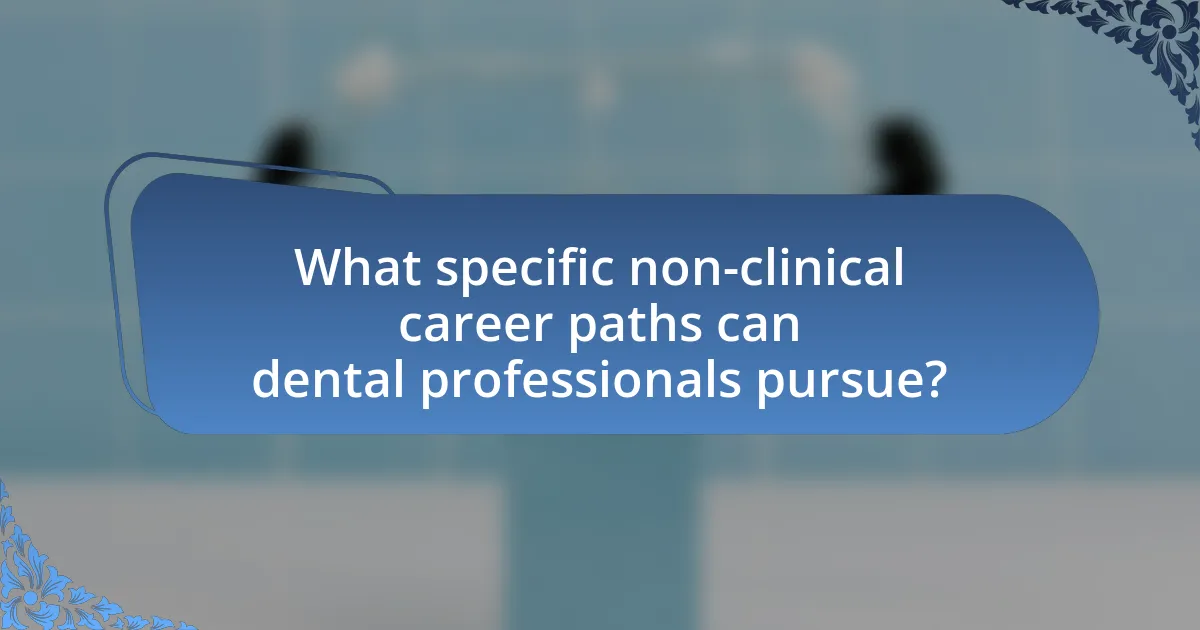
What specific non-clinical career paths can dental professionals pursue?
Dental professionals can pursue various non-clinical career paths, including roles in dental education, research, public health, dental sales, and dental consulting. In dental education, professionals can become instructors or professors, teaching future dentists and dental hygienists. Research positions allow dental professionals to contribute to advancements in oral health through studies and clinical trials. Public health roles focus on community health initiatives, promoting oral health awareness and preventive care. In dental sales, professionals can work for companies that manufacture dental products, utilizing their clinical knowledge to inform and educate clients. Lastly, dental consulting involves advising practices on management, marketing, and operational efficiency, leveraging their expertise to improve business outcomes. These paths leverage the skills and knowledge gained in clinical practice while allowing for diverse career opportunities outside of direct patient care.
What roles exist in dental education and academia?
In dental education and academia, roles include dental educators, researchers, program directors, and clinical instructors. Dental educators are responsible for teaching dental students and developing curricula, while researchers focus on advancing knowledge in dentistry through scientific studies. Program directors oversee dental education programs, ensuring they meet accreditation standards and educational goals. Clinical instructors provide hands-on training to students in clinical settings, bridging the gap between theoretical knowledge and practical application. These roles collectively contribute to the advancement of dental education and the preparation of future dental professionals.
How can dental professionals contribute to dental education?
Dental professionals can contribute to dental education by engaging in teaching, mentoring, and developing educational resources. By sharing their clinical expertise and practical experiences, they enhance the learning environment for dental students. For instance, dental professionals often serve as adjunct faculty in dental schools, where they provide real-world insights and guidance, thereby bridging the gap between theory and practice. Additionally, they can create and disseminate educational materials, such as textbooks and online courses, which are essential for ongoing professional development. Research indicates that active participation of practitioners in education improves student outcomes and prepares future dentists for the challenges of the profession.
What are the opportunities for research in dentistry?
Opportunities for research in dentistry include advancements in biomaterials, oral microbiome studies, and the development of innovative dental technologies. Research in biomaterials focuses on creating materials that enhance dental restorations and implants, improving patient outcomes. Studies on the oral microbiome investigate the relationship between oral health and systemic diseases, providing insights into preventive care. Additionally, research into dental technologies, such as teledentistry and digital imaging, aims to improve diagnostic accuracy and patient accessibility. These areas are supported by ongoing studies published in journals like the Journal of Dental Research, which highlight the significance of interdisciplinary approaches in dental research.
What opportunities are available in dental administration and management?
Opportunities in dental administration and management include roles such as dental office manager, practice administrator, and dental billing specialist. These positions involve overseeing daily operations, managing staff, ensuring compliance with regulations, and handling financial aspects of dental practices. According to the Bureau of Labor Statistics, employment for medical and health services managers, which includes dental administration roles, is projected to grow by 32% from 2020 to 2030, indicating a strong demand for professionals in this field. Additionally, certifications such as Certified Dental Practice Management (CDPM) can enhance career prospects and demonstrate expertise in the field.
How can dental professionals transition into management roles?
Dental professionals can transition into management roles by acquiring relevant business and leadership skills through formal education, such as obtaining a degree in healthcare management or business administration. This educational background equips them with essential knowledge in finance, human resources, and strategic planning, which are critical for effective management. Additionally, gaining experience in administrative tasks within their current roles, such as overseeing staff or managing budgets, can provide practical insights into management responsibilities. Research indicates that professionals with a combination of clinical expertise and management training are more likely to succeed in leadership positions, as they can bridge the gap between clinical practice and operational efficiency.
What skills are essential for success in dental administration?
Essential skills for success in dental administration include strong organizational abilities, effective communication, financial management, and knowledge of dental software systems. Organizational skills are crucial for managing schedules, patient records, and office operations efficiently. Effective communication is necessary for interacting with patients, staff, and vendors, ensuring clarity and professionalism. Financial management skills are important for budgeting, billing, and insurance processing, which directly impact the practice’s profitability. Proficiency in dental software systems enhances operational efficiency and data management, facilitating smoother workflows. These skills collectively contribute to the effective administration of a dental practice, ensuring both operational success and high-quality patient care.
What are the emerging fields in dentistry that offer non-clinical opportunities?
Emerging fields in dentistry that offer non-clinical opportunities include dental informatics, dental public health, and dental education. Dental informatics focuses on the integration of data and technology to improve patient care and operational efficiency, with a growing demand for professionals skilled in data analysis and health information systems. Dental public health emphasizes community health initiatives and policy development, addressing oral health disparities and promoting preventive care at a population level. Additionally, dental education is evolving with the need for educators and trainers to prepare future dental professionals, particularly in areas like digital dentistry and telehealth. These fields reflect the increasing importance of technology, community engagement, and education in the dental profession.
How is technology shaping non-clinical roles in dentistry?
Technology is significantly shaping non-clinical roles in dentistry by enhancing administrative efficiency and improving patient engagement. For instance, dental practice management software automates scheduling, billing, and patient records, allowing non-clinical staff to focus on customer service and operational tasks rather than manual paperwork. Additionally, telehealth platforms enable dental professionals to conduct virtual consultations, expanding access to care and allowing non-clinical roles to include remote patient interaction and follow-up. According to a report by the American Dental Association, the integration of technology in dental practices has led to a 30% increase in operational efficiency, demonstrating the tangible impact of technology on non-clinical roles.
What are the prospects for dental consulting and entrepreneurship?
The prospects for dental consulting and entrepreneurship are strong, driven by the increasing demand for specialized knowledge in the dental industry. As dental practices seek to improve efficiency, patient care, and profitability, consultants who offer strategic insights and operational improvements are becoming essential. According to the American Dental Association, the dental consulting market is projected to grow significantly, reflecting a broader trend where dental professionals are increasingly looking for guidance on practice management, marketing strategies, and regulatory compliance. Additionally, entrepreneurship in dentistry is thriving, with opportunities for creating innovative dental products, services, and technologies, supported by a growing emphasis on patient-centered care and digital solutions. This combination of consulting and entrepreneurial ventures positions professionals to capitalize on emerging trends and address the evolving needs of the dental market.
What practical steps can dental professionals take to explore non-clinical careers?
Dental professionals can explore non-clinical careers by engaging in networking, pursuing additional education, and gaining relevant experience. Networking with professionals in fields such as dental consulting, education, or public health can provide insights and opportunities. Pursuing further education, such as a master’s degree in public health or business administration, can enhance qualifications for roles outside of clinical practice. Additionally, gaining experience through internships or volunteer work in non-clinical settings can help dental professionals understand different career paths and build necessary skills. These steps are supported by the increasing trend of dental professionals transitioning into roles that leverage their expertise in non-clinical environments, as evidenced by the growing number of dental graduates seeking careers in academia and healthcare management.
How can professionals assess their interests and skills for non-clinical roles?
Professionals can assess their interests and skills for non-clinical roles by utilizing self-assessment tools, seeking feedback from peers, and engaging in reflective practices. Self-assessment tools, such as career interest inventories and skills assessments, help individuals identify their strengths and preferences, providing a structured approach to understanding their capabilities. Feedback from colleagues and mentors offers external perspectives on an individual’s skills, highlighting areas of expertise and potential growth. Engaging in reflective practices, such as journaling or participating in career coaching, allows professionals to evaluate their experiences and aspirations, further clarifying their interests in non-clinical roles. These methods are supported by research indicating that structured self-assessment can lead to improved career satisfaction and alignment with personal values.
What resources are available for dental professionals seeking non-clinical opportunities?
Dental professionals seeking non-clinical opportunities can access various resources, including professional organizations, online job boards, and educational programs. Organizations such as the American Dental Association (ADA) and the Academy of General Dentistry (AGD) provide networking opportunities and career resources tailored for non-clinical roles. Online platforms like LinkedIn and Indeed feature job listings specifically for dental professionals in areas such as dental consulting, education, and research. Additionally, continuing education programs and webinars offered by dental schools and professional associations can enhance skills relevant to non-clinical positions, facilitating career transitions.
